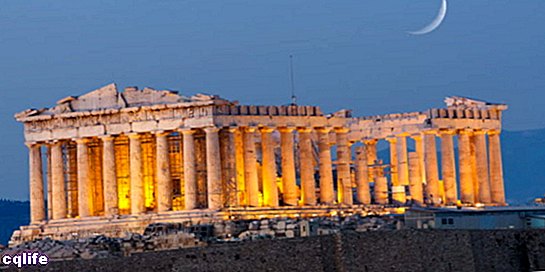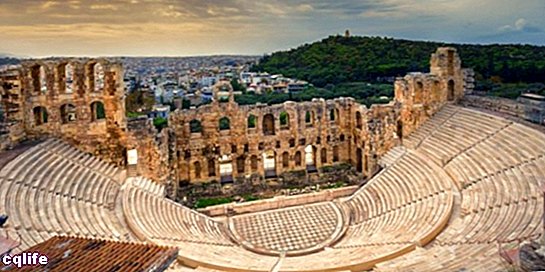- Greek culture
- Greek Culture History
- Location of Greek culture
- Characteristics of Greek culture
- Contributions of Greek culture
- Greek and Roman culture
We explain everything about Greek culture, its contributions, history and geographical location. Also, its relationship with Roman culture.

Greek culture
The culture of Ancient Greece, also known as Ancient Greece or Classical Greece, is the so-called cradle of Western Civilization: it was one of the most influential and important cultures in the antiquity Mediterranean. Its center was the ancient city-state of Athens.
Much of this culture survives today. In fact, it has strongly influenced many aspects of Western culture: the imaginary, the politics, the tongue, the Arts, the philosophy, the Sciences and the Educational systems.
Its current importance is due not only to the wealth of thought and to the expansionist nature of the Greeks, but also to their later conquest and assimilation by the Roman Empire in the 2nd century BC. C.
Anyone who has had an approach to the vast Greek mythology or to the fundamental thinkers who bequeathed to humanity, such as Socrates, Plato and Aristotle, among many others, you can get an idea of the importance of this ancient civilization.
This culture was practically prohibited and silenced during the 1500 years of Christian Middle Ages, branded as pagan. However, much of it survived in the Byzantine Empire (or Eastern Roman Empire), until its fall to the Ottomans. In fact, its reappearance in the West occurred during the Renaissance European of the 15th and 16th centuries.
Other cultures:
| Teotihuacan culture | Mayan culture |
| Olmec culture | Aztec culture |
Greek Culture History
Before the beginning of the Greek culture, there was the Mycenaean civilization that emerged south of the Balkans at the end of the Bronze Age (16th century BC). This important civilization fell around the 12th century BC. C., giving way to the Dark Ages that preceded the Doric Invasion.
The so-called Hellenic Greece began in the 8th century BC. C., as a consequence of that invasion, being heir to a large extent of the Mycenaean imagination, religion and language. The event that marks its formal beginning is the celebration of the first Olympic Games in the year 776 a. C.
The history of Ancient Greece is usually divided into the following periods:
- Archaic period (750-500 BC). Characterized by its sculptures endowed with the typical "archaic smile", it extends from the end of the Dark Ages to the defeat of the last tyrant of Athens: Hippias, son of Pisistratus, and the establishment of the democracy Athenian in the year 510 a. C.
- Classic period (500-323 BC). In which Greek culture flourishes and reaches its ideal forms, with the construction of its great temples, the writing of its great works literary, etc.
- Hellenistic period (323-146 BC). In which Greek culture spreads across the Mediterranean, Africa Y Asia, by the hand of Alexander the Great (356-323 BC). It culminates in the defeat of Greece against the Roman troops, weakened as it was by its internal conflicts.
- Roman Greece (146 BC-330 AD). In which Greece was part of the dominions of the Roman Empire, until the town of Byzantium, capital of the Greek province of Thrace, as capital of the Roman Empire by Emperor Constantine I and baptized as New Rome or Constantinople.
- Late Antiquity (330-529 AD). In which the wealth of the culture Greek is silenced by the 529 edict of the Emperor Justinian I, where any religion other than Christianity was forbidden and the Academy of Athens, founded by Plato in 387 BC, was closed. C.
Greek history proper concludes with the Roman invasion of 146 BC. C., after the Battle of Corinth.
Location of Greek culture
Greek culture was born in the Mediterranean and spread with the Macedonian Empire.The culture of Ancient Greece arose south of the Balkans, in the eastern Mediterranean.In its heyday it took root throughout the Greek peninsula, between the Ionian Sea and the Aegean Sea, expanding northward and towards the coasts of present-day Macedonia and Bulgaria, as well as the opposite coasts of present-day Turkey, and the southern and eastern Italy.
Greek civilization also founded populations along the European Mediterranean coast, in present-day Spain and France, as well as on the coast of present-day Egypt.
During the Hellenistic period, under the leadership of the conqueror Alexander the Great, Greece (actually called the Macedonian Empire) annexed the territories of present-day Turkey, Egypt, part of Libya, Syria, Jordan, Palestine, Israel, Armenia, and ancient Mesopotamia.
At the time of the greatest expansion of the empire, it covered the former Persian Empire in the current territories of Iraq, Iran, Kuwait, Afghanistan, Pakistan and part of Uzbekistan and Turkmenistan.
Characteristics of Greek culture
Ancient Greek culture was an eminently maritime culture, given its location in the heart of the Mediterranean, with a strong commercial and expansive spirit. It was politically-socially organized in city-states, called cops, the main of which were Athens, Sparta, Corinth and Thebes.
Its territory could be classified in mainland Greece, insular Greece and Asiatic Greece. Greek was spoken in all his cities and philosophy, the arts, politics and warfare were widely cultivated. Despite the evident political fragmentation of their civilization, the Greeks were aware of being a unique and singular people.
They had a polytheistic religion, with a vast and complex imaginary, which worshiped numerous major and minor deities, gathered in the Olympic pantheon. They were led by Zeus, father and god of the heavens, along with his brothers Poseidon, god of the seas, and Hades, god of the Underworld.
In their cities slavery was practiced, despite being the inventors of the democracy and that birth in ancestral families did not really represent any particular benefit in the cops. Slaves used to be captives defeated during the war, or citizens who broke the laws and were arrested.
Unlike other systems slavers, slaves were not treated in a subhuman way, but formed a lower class in Greek society. They were at the service of their masters but they obtained a payment for their work (gifts) and being able to start a family in relative Liberty.
Slaves of the Condition, turned into public servants or caretakers of temples. Slaves freed by their masters did not become citizensInstead, together with foreigners, they formed part of the Metecos: free residents without the right to political participation.
Contributions of Greek culture

The contributions of Ancient Greece are not negligible, and cover a huge set of areas. We will list some of the most relevant below:
- The invention of direct democracy, specifically in Athens, although it was a democracy for Athenian males of legal age (excluding women, slaves, and Meticians).
- Creation of the Olympics (and continued celebration for centuries) the festivities sports in honor of the gods of Olympus who brought an "Olympic peace" between all Greek cities.
- The formal invention of philosophy, a word coined by Pythagoras in the 6th century BC. C., and its practice by fundamental thinkers for the West such as Socrates, Plato, Aristotle or Democritus. Many of them dabbled in what we now call Sciences or math, also bequeathing important concepts such as the atomic theory (Democritus), various mathematical theorems (Thales of Miletus, Pythagoras, etc.), medicine (Hippocrates), the theory of the four humors (Empedocles), and a huge etcetera.
- Varied and valuable artistic traditions, of which literature stands out above all, loaded with the mythological content that its religion and that they grew in verse, occupying a prominent place Homer (cultist of the epic: the Iliad and the Odyssey), Aesop (author of numerous fables), Aristophanes (author of comedies) or the great Greek playwrights: Sophocles, Aeschylus and Euripides. Herodotus (geographer and historian) and Hesiod (poet and philosopher) also stand out.
- The vast and important Greek mythology, where the foundational stories of the world and the gods (cosmogony and theogony), the myths about the rise of the Olympians to power defeating their titanic predecessors, the heroic myths and a huge set of symbols, stories and characters.
Greek and Roman culture
Greek and Roman culture ended up being very similar and almost indissoluble. When the Romans conquered the Greeks, fascinated by the robust culture they found, they began to assimilate it as their own.
They only limited themselves to changing the names of everything to Latin, but respecting a huge percentage of the original content of the Hellenic culture. Thus was born the Greco-Roman or Greco-Roman culture, in which Zeus happened to be called Jupiter, Aphrodite happened to Venus, Ares happened to Mars, etc.
